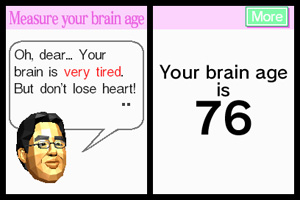My Continual Frustration with Game Reviews
April 16th, 2008
Even though nothing of the sort is on the blog yet, I have recently been writing a few articles about casual and non-gaming themed games. As I’ve been transferring my thoughts into a digital format I’ve started to realize some of the major issues that these types of games face when put up for review. It seems that no matter how well these games excel in their respective area (training your brain, karaoke etc.) they were always seem to fall up short when it comes to game reviews. Upon this realization I have been re-analyzing my stance on video game reviews and over the past couple of weeks I have drawn a series of conclusions that I’d like to share with you.
Prelude
Before my eventual realization I noticed a few strange quirks about some games which I would now like to use as examples.
 My first observation was Brain Training on the Nintendo DS, my personal view on this game, as has been probably already been mentioned in this blog before, is that it perfects a design in which itself has created. The exercises in the game are designed to test your brain. It sounds ridiculous that I have to almost re-phrase the game’s title to actually emphasis my realization of what I am doing when I play this game. Obviously I know that this game is about testing the brain but it wasn’t until I went hands on that I could admire it’s simple effectiveness which it dishes out in strides. It is an odd sensation; you can actually feel your brain working away, its quite incredible.
My first observation was Brain Training on the Nintendo DS, my personal view on this game, as has been probably already been mentioned in this blog before, is that it perfects a design in which itself has created. The exercises in the game are designed to test your brain. It sounds ridiculous that I have to almost re-phrase the game’s title to actually emphasis my realization of what I am doing when I play this game. Obviously I know that this game is about testing the brain but it wasn’t until I went hands on that I could admire it’s simple effectiveness which it dishes out in strides. It is an odd sensation; you can actually feel your brain working away, its quite incredible.
Brain Training is almost flawless in approach and because of this I believe that it is one of the must play experiences on this system. It is unique to it’s platform and is something that demands to be sampled at least once. Not so according to the reviews generated by Game Rankings which mark this title as being decidedly average 78% (NB: to the average gamer >80% is regarded as ‘average’ or not worthy of purchase).
Lets take another title of interest; House of the Dead 2 and 3 Return for the Wii. This game has been praised but also severely panned at the same time with great misunderstanding from me. According to the game reviews, the dated visuals and presentation are reasons to hinder one’s purchase of this title. But, in my mind isn’t that the point of buying the compilation? Yes the visuals are dated but this is what you should expect from two last generation titles, why penalize the game for what it is trying to be? Why not review this game on the grounds of a (price reduced) retro compilation rather than a fully fledged Wii game?

What I am trying to drill home here is context and how the current review model falls apart with varying context.
Defining the Current Review Model
Mainstream video game reviews since conception have been fixated on a certain orientation of play expectancy. The typical video game review is looking for the $AUD99,AAA blockbuster title set for a core gamer market. It is only recently with the strong change in:
- consumer audience
- digital distribution
- game objectives (ie. second language acquisition)
- prices (reduced on release, budget titles)
- packages (Orange Box, retro compilations)
that we have seen such a discourse. These are several variables that break the current reviewing model, lets look at these ideas in some finer detail.
Different Games for Different Consumers
Casual and non gamer games are perhaps the most ideal example in this situation. Have you ever noticed that it is rare for a Brain Training, Singstar or Talkman to receive an 85%+ review score yet at the same time these titles more than suit the needs of the consumers buying these games. Brain Training for what it does is an almost flawless treadmill for the brain yet reviewers seem to think that it doesn’t qualify for an essential purchase. People who play Singstar are generally pretty happy with what they are playing (despite some minor playlist quibbles) as it fulfills the expected experience. These games do what they are designed to do and do it exceedingly well, unfortunately the currently model with it’s limited scope refuses them. It makes me question what must these games do in order to crack a 95% review score? Think about that.
Abstract Inconventions
 This current model has a preconceived idea of the perfect, 100% video game which is why the previous point is valid. It is also why other games that differ from normal expectation cause such a myriad of controversy. Take Killer 7 for example, Killer 7 is one obscure, abstract game which pushed arthouse over gameplay. When this title was squeezed through the reviewing criterion it came out as pulp and no juice. Gamers (many of which are by system set in their ways(see Gamer’s Instinct)) were also outraged at this convention smashing title yet for others it was downright compelling. The point in case here is that Killer 7 does not actually meet the requirements of an acceptable game, it itself is not game enough. The problem is not that Killer 7 does not meet the expectation of what a game is but rather who ever gave reviews the right to tell us what a game is and isn’t, what a game can and cannot be? Is this not proof of a single sided, broken system?
This current model has a preconceived idea of the perfect, 100% video game which is why the previous point is valid. It is also why other games that differ from normal expectation cause such a myriad of controversy. Take Killer 7 for example, Killer 7 is one obscure, abstract game which pushed arthouse over gameplay. When this title was squeezed through the reviewing criterion it came out as pulp and no juice. Gamers (many of which are by system set in their ways(see Gamer’s Instinct)) were also outraged at this convention smashing title yet for others it was downright compelling. The point in case here is that Killer 7 does not actually meet the requirements of an acceptable game, it itself is not game enough. The problem is not that Killer 7 does not meet the expectation of what a game is but rather who ever gave reviews the right to tell us what a game is and isn’t, what a game can and cannot be? Is this not proof of a single sided, broken system?
Don’t just hold the phone there my friend, it is not just this obvious refusal of fair criticism which is problematic, more importantly it is unwritten bias. Shoot ’em up (shmps), 2D fighters, point and click action adventure titles are all cast to the side for the preference of first person shooters, 3rd person action adventures and platformers. They defy general expectation and are punished for it much like Killer 7.
Different Price Points
Price points are also very problematic. How much weight do you put on price, how many dollars translate to an equivalent percent score? If a game is terrible but only cost $2 how does this stack up against a $100 game which is also terrible? There are clearly a lot of hurdles here.
Weight Issues
There are also issues with variance between weight placed on:
Refurbished Content, Sequalitis and Originality
Do you punish ‘inspired’ games for lacking originality? What about remakes and sequels? Why is it that more of the same is not necessarily a good thing?
Graphics, Sound and the Dreaded Technological Bias
Is gameplay weighted more evenly with graphics and sound? How much does sound and graphic actually affect the gameplay?
Console Comparison
How do we take the respective console into consideration? How much of this is the fault of the manufacturers as is the game developers? Is this version inferior to it’s console X counterpart? Does this matter?
Final Comments – ie. How do we fix this thing?
Beats me. Seriously it does, there are two ideas which have already been raised which are to resort to a 4/5 star rating system like movie reviews and secondly critique. To knock the first idea off it’s perch, simplifying the rating system still leaves the majority of problems in place.
Critique on the other hand grabs my eye. I have been slowly investigating this idea and from what I can gather critique is much more like someone sharing their experiences than reviewing by criteria (please, I am always up for corrections). Critique allows readers to understand why the person liked or disliked the game, in critique a game would not systematically be disregarded by it’s presentation or other blemishes. The way I see it is that critique is an attempt to highlight the game for what it is and what impact it had on the critiquer. I’m really uncertain if I am hitting the mark here with my review of critique (save me from the puns!). I find it difficult to describe with clarity.
Critique, from my perspective appears to be free of the negatives which have been discussed because critique is not glued to a strict model in which it must abide by. Critique is also dependent on the person providing the critique and is not intended to be the be all and end all solution for every audience.
 Critique itself can be found everywhere; on blogs, discussion boards, with friends. I personally think that the Australian TV show Good Game also borders on critique as well despite being bound by a scale. In fact a scale is not wholly destructive of critique, its inclusion or exclusion is almost a non event, it doesn’t really matter. Many sources claiming to be reviews actually offer critique. This is about the stage where I am uncertain on if I drawn the right line, so let s leave it there.
Critique itself can be found everywhere; on blogs, discussion boards, with friends. I personally think that the Australian TV show Good Game also borders on critique as well despite being bound by a scale. In fact a scale is not wholly destructive of critique, its inclusion or exclusion is almost a non event, it doesn’t really matter. Many sources claiming to be reviews actually offer critique. This is about the stage where I am uncertain on if I drawn the right line, so let s leave it there.
Wrapping up, I don’t feel as though I have covered every single relevant point considering game reviews nor have I really covered what I have with much precision. Now that I have written down my observations though it becomes apparent that the current system is very problematic.



 Game Design Companion: A Critical Analysis of Wario Land 4 - $7.99
Game Design Companion: A Critical Analysis of Wario Land 4 - $7.99 Level Design: Processes and Experiences
Level Design: Processes and Experiences Speed Boost: The Hidden Secrets Behind Arcade Racing Design - $5.99
Speed Boost: The Hidden Secrets Behind Arcade Racing Design - $5.99 Adventures in Games Analysis: Volume I - $5.99
Adventures in Games Analysis: Volume I - $5.99







